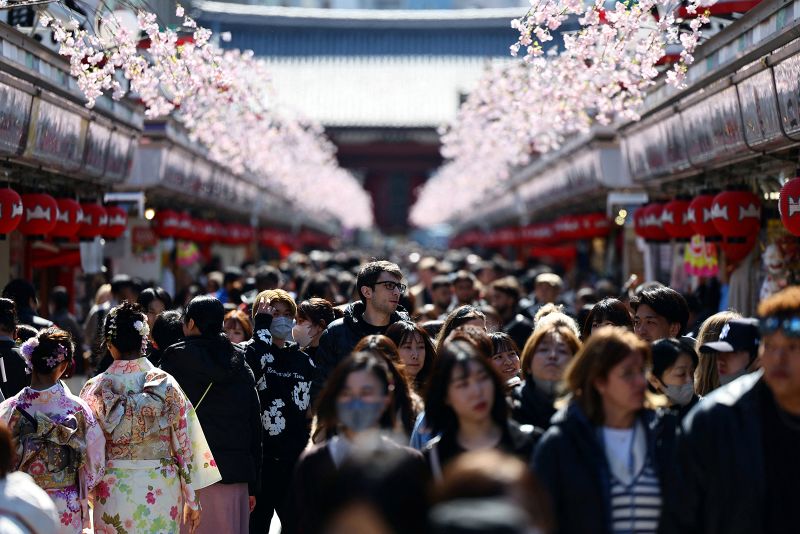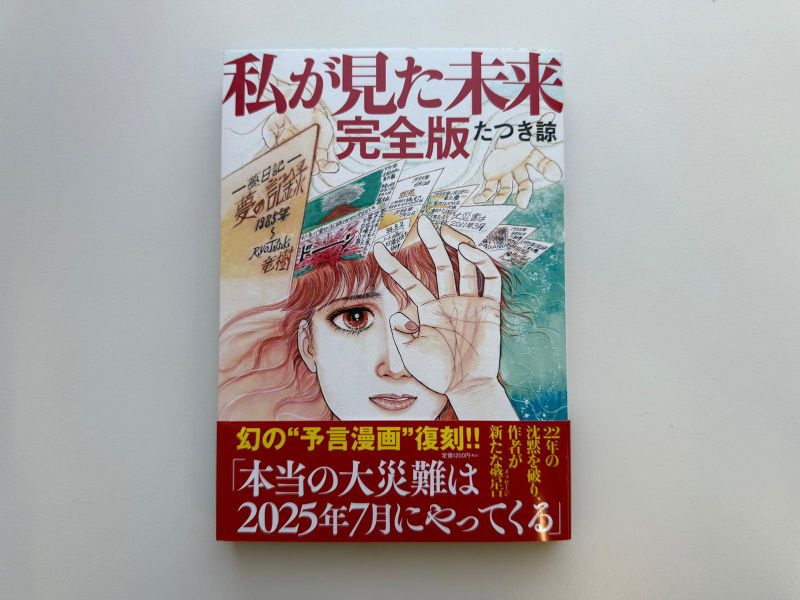Japanese Baba Vanga: The Rising Fascination with Japan’s Modern Fortune Teller
Japanese Baba Vanga: The Rising Fascination with Japan’s Modern Fortune Teller

A Japanese comic book warns of a “real catastrophe.” A psychic predicts mass destruction. A feng shui master urges people to stay away. This might sound like the plot of a disaster movie, but for Japan’s tourism industry, a recent wave of so-called earthquake-related predictions has led to a surge in superstitious travelers canceling or delaying their holidays, especially those from East Asia.
This new phenomenon, dubbed the “Japanese Baba Vanga,” reflects how modern fortune telling and prophetic storytelling in Japan are influencing real-world decisions, including travel plans.
The Comic Book That Shook Japan and Beyond
At the heart of this wave is a manga titled The Future I Saw, published in 1999 by Japanese artist Ryo Tatsuki. The comic warns of a massive disaster and eerily predicted the catastrophic 9.0-magnitude earthquake that struck Japan’s northern Tohoku region in March 2011. This quake triggered a deadly tsunami and the Fukushima nuclear crisis, one of the worst nuclear disasters since Chernobyl.
Tatsuki’s manga blends fiction with prophetic visions she claims to receive in dreams. The comic has a strong following across East Asia, with fans crediting her with foreseeing other major events such as the deaths of Princess Diana and Freddie Mercury, and even the COVID-19 pandemic, though critics argue her predictions are vague.
In 2021, Tatsuki released a “complete version” of the manga, claiming that another major earthquake will strike on July 5, 2025. This would form between Japan and the Philippines, which could generate tsunamis three times bigger than what was seen in the 2011 Tohoku disaster.
Her prediction of oceans 'boiling' points towards a possible underwater volcanic eruption or similar seismic event, in a diamond-shaped region that connects Japan, Indonesia, Taiwan, and the Northern Mariana Islands.
It is known for its geological activity and is responsible for numerous seismic events in the area.
This prediction, along with warnings from psychics and feng shui masters in Japan and Hong Kong, has triggered a wave of anxiety and led to travel cancellations.

Tatsuki is not the only doomsayer.
Chinese media have reported on the predictions of a self-proclaimed Japanese psychic who suggested that a massive earthquake would hit the densely populated Tokyo Bay Area on April 26. Although the date passed without incident, the prediction sparked immense interest on Chinese social media.
Qi Xian Yu, a renowned feng shui master and Hong Kong TV personality known as Master Seven, also advised people to avoid Japan starting in April.
Japan’s Cabinet Office took to X earlier this month to explain that modern technology has yet to accurately predict an earthquake.
Meanwhile, Yoshihiro Murai, the governor of Miyagi prefecture, which was hit hard during the 2011 quake, spoke out against the impact of superstitious beliefs on Japan’s tourism.
“I believe it is a serious issue when the spread of highly unscientific rumors on social media has an effect on tourism,” he said during a press conference.
The Ripple Effect on Japan’s Tourism
According to CN Yuen, managing director of Hong Kong-based travel agency WWPKG, bookings to Japan dropped by half during the Easter holidays and are expected to decline further in the coming months. The main source of cancellations comes from mainland China and Hong Kong—Japan’s second- and fourth-largest tourism markets—while fear has also spread to Thailand, Vietnam, and other East Asian countries via social media.
Social media platforms in these countries are flooded with posts and videos urging travelers to reconsider trips to Japan due to impending “disasters.” Yuen explained that this anxiety has become “ingrained,” with many people choosing to “hold off their trip for now.”
Samantha Tang, from Hong Kong, has postponed her trip to the country. Initially, she intended to visit Wakayama, a beach destination about 50 miles south of Osaka, in August, but she has gotten cold feet.
“Everyone says so much about an earthquake coming,” stated the 34-year-old yoga instructor, who mentioned that she has traveled to Japan for vacation at least once a year since the end of the pandemic.
Another traveler from Hong Kong, Oscar Chu, aged 36, who typically visits Japan several times annually, has changed his plans this year as well.
“It’s best to avoid it. It’s going to be really troublesome if an earthquake indeed happens,” he said. He elaborated that while he wasn’t particularly anxious about experiencing an earthquake itself, he was concerned about the subsequent chaos in travel and potential flight disruptions.
Nonetheless, many tourists remain undeterred.
According to the Japan National Tourism Organization, the number of visitors to Japan surged to a record-breaking 10.5 million in the first three months of 2025.
In the first quarter of this year, 2.36 million travelers from mainland China visited Japan, marking a 78% rise from last year, as reported by the tourism agency.
During the same period, approximately 647,600 residents of Hong Kong traveled to Japan, representing an overall year-on-year increase of 3.9%.
And that’s just the tourists from East Asia!
In March, 343,000 tourists from the United States visited Japan, 68,000 from Canada, and 85,000 Australians.
Vic Shing from Hong Kong is one of those who has not altered his plans. Despite hearing about “the prophecy,” he expressed his continued commitment to his vacation in Japan this year, where he will be visiting Tokyo and Osaka in June.
“Earthquake predictions have never been accurate,” he said.
Even if one did hit, “Japan has encountered many massive earthquakes before. It shouldn’t be too bad when it comes to disaster management,” he added.
Seismologists Weigh In: The Reality of Earthquake Prediction
Japan is located on the Pacific Ring of Fire, making it highly susceptible to seismic activity. While fears of a “big one” have persisted for decades—especially after government warnings of an 80% chance of a severe quake hitting the southern Nankai Trough within 30 years—scientists agree that precise earthquake prediction remains impossible.
The Japanese Cabinet Office recently clarified on social media that modern technology cannot accurately predict earthquakes. Meanwhile, Miyagi prefecture governor Yoshihiro Murai, whose region was devastated in 2011, criticized the spread of “highly unscientific rumors” on social media, emphasizing the negative impact on tourism.
Who is the Japanese Baba Vanga?
The term “Japanese Baba Vanga” is a colloquial way to describe figures like Tatsuki and other fortune tellers or psychics whose predictions capture public imagination and stir anxiety. Unlike Baba Vanga—the Bulgarian mystic known worldwide for her somber prophecies—Japan’s modern counterparts mix traditional spiritual practices with pop culture, especially manga and online content.
Tatsuki’s manga uniquely portrays herself as a character sharing visions gleaned from dreams, blending storytelling with prophecy. This hybrid approach engages a broad audience, especially younger generations, and makes spiritual messages more accessible through entertainment.
The Prophecy Effect: Balancing Belief and Reality
Despite the alarm caused by these predictions, Japan remains a highly popular travel destination. In the first quarter of 2025, Japan welcomed a record-breaking 10.5 million visitors, with tourists from China, Hong Kong, the United States, Canada, and Australia contributing to this surge.
Some travelers, like Samantha Tang and Oscar Chu from Hong Kong, have postponed their trips out of fear of the predicted earthquake or potential travel disruptions. Others, like Vic Shing, remain unfazed, confident in Japan’s disaster preparedness and skeptical of earthquake prophecies.
Japanese manga artist Tatsuki herself has urged caution, telling the Mainichi Shimbun newspaper that while she sees the interest in her work positively as a prompt for disaster preparedness, people should not be “overly swayed” by her dreams and must “act appropriately based on expert opinions.”
Conclusion
The Japanese Baba Vanga phenomenon—epitomized by Tatsuki’s prophetic manga and echoed by psychics and social media—illustrates how modern Japan is blending tradition, storytelling, and digital culture to influence perceptions and behaviors on a global scale.
While earthquake predictions remain scientifically impossible, the power of prophecy and storytelling to shape human decisions—especially travel—is undeniable. For Japan’s tourism industry, navigating the delicate balance between respecting cultural beliefs and combating misinformation is now more important than ever.
